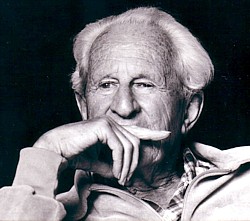Norman Birnbaum Bio
Birnbaum, Norman (b. 1926),  Emeritus Professor
of Sociology at Georgetown University Law Center, member of the editorial board of The
Nation.
Emeritus Professor
of Sociology at Georgetown University Law Center, member of the editorial board of The
Nation.
- Georgetown
faculty biography; Wikipedia page
- Contribution to Doug
Ireland's July 2005 blog entry:
"Here are some
brief recollections of Herbert. There is little new to say about his intellectual
and political influence. I have always thought of Eros And Civilization
as a major work, combining historical insight and human imagination. Compared
with the others of the Frankfurt School of his generation, Herbert was
far more cosmopolitan, more committed, more courageous (I think of the
disgraceful episode in which Horkheimer attempted to have the young Juergen
Habermas dismissed from the Institut fuer Sozialforschung because
of his political views.) What I now think of, however, are Herbert's great
human qualities: forthrightness, an enormous capacity for enjoyment, and
a splendid sense of humor.
"I recollect his marvelous talk on Max Weber at the 1964 German Sociological
Association Weber centenary meeting. [published in
New Left Review, March/April 1965, pp. 3-17] Raymond
Aron, Pietro Rossi, Talcott Parsons had given reasonable academic evaluations
of Weber (Parsons, to be sure, had somehow situated him 'beyond ideology,'
a location which would have rendered Weber himself uncomfortable.) Herbert
(seconded by Habermas) delivered a large critique of Weber's Dec[is]ionism,
connecting him to Carl Schmitt, and raised the question of how value-free
the advocate of a value-free social science actually was. He invited the
public to ask if Weber did not bear some responsibility for the intellectual
onslaught on the Weimar Republic which prepared the way for Nazism---which
was, in 1964, a breach of German academic decorum.
"I also remember the way he began the talk, by citing the inscription
over the doorway of the university building, in Heidelberg, in which the
meeting was held: "Dem Lebendigen Geist" (roughly, 'To
The Living Spirit') 'Es gibt Dinge, die man nicht uebersetzten kann.'
'There are phrases which are untranslatable.' I believe that the visit
occasioned some melancholic self-reflection on whether he should have taken
a full-time academic post in post-war Germany. In the end, of course, Herbert
could hardly complain of a lack of influence in Germany and there is hardly
a member of the present government who will not have read his writings.
That he would greet with all of his irony---and so prepare the way for
the next try.
"We were having a drink in the Heidelberger Hof and the singular
conventionality of some of the other guests caught his attention. 'Norman,
reality is its own caricature.'
I also recall a visit to Herbert and Inge, winter of 1969. ... It was snowing
in New England, and I had to cope with ice and fog on Highway 91 as I drove
from Amherst to Hartford airport. The next morning, Herbert and I walked
to the La Jolla campus, with its palm trees, attractive women in Californian
splendor, and tie-less nearness to sensuality. 'Herbert, what a contrast
with New England!' 'Norman, I have always told you, winter is a bourgeois
ideology' ... May his memory be blessed."

 Emeritus Professor
of Sociology at Georgetown University Law Center, member of the editorial board of The
Nation.
Emeritus Professor
of Sociology at Georgetown University Law Center, member of the editorial board of The
Nation.